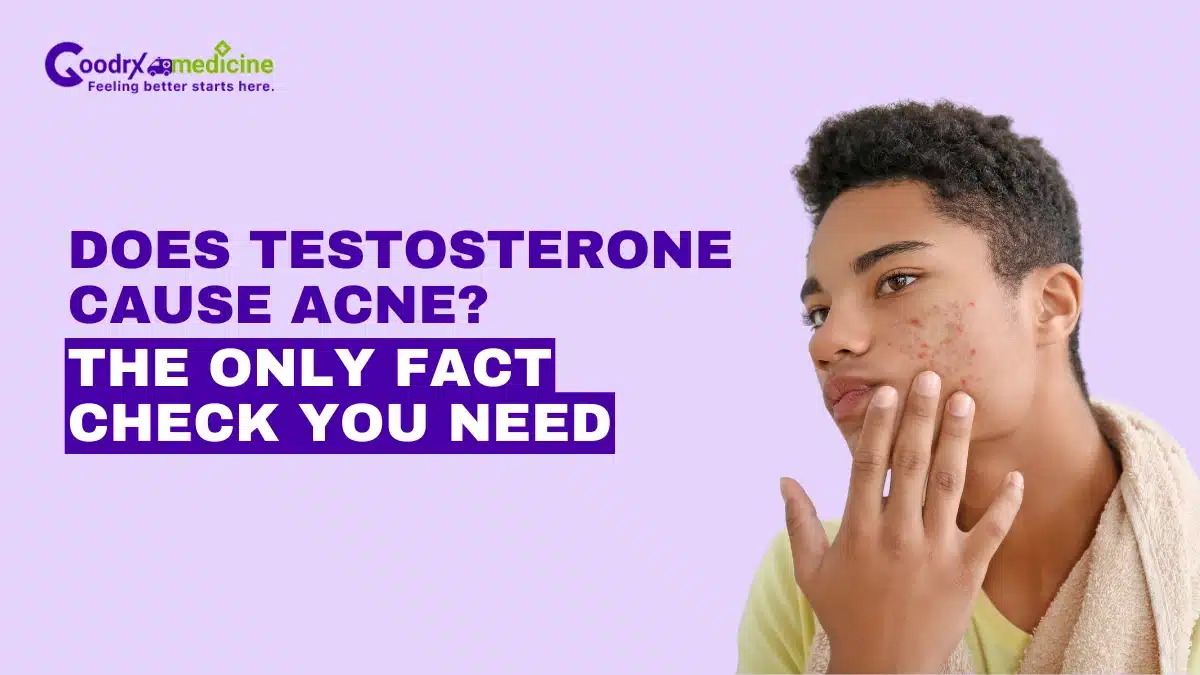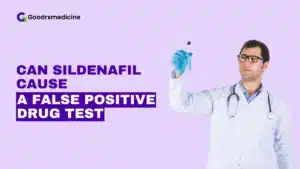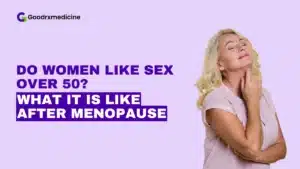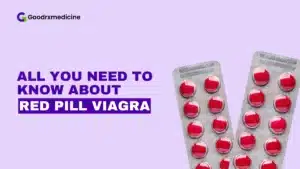Testosterone is responsible for numerous changes during puberty and adulthood, like voice changes and libido. However, does Testosterone cause acne?. If you’ve ever noticed breakouts appearing during certain life stages or treatments, you might have wondered if hormonal fluctuations are playing a role.
Testosterone is one such powerful hormone present in everyone that influences far more than just physical strength and energy levels. It can also leave its mark on your skin. But the way it does this isn’t always straightforward.
Some people notice frequent flare-ups, while others see no change at all. What makes the difference? And how can you tell if Testosterone is really to blame for those frustrating acne breakouts?
Let’s explore the connection and uncover what science says, and what it doesn’t, about Testosterone’s role in acne.
Does Testosterone cause acne?
Yes, High Testosterone levels can indirectly contribute to the development of acne, a skin condition that leads to outbreaks of lesions (pimples or zits).
It is also not the only cause of acne. Genetics, hormones, diet, sweating, and skincare habits may be other contributing factors. Also, not everyone with High Testosterone will get acne, as individual responses to hormone levels can vary.
Save up to 90% on your medicine bills
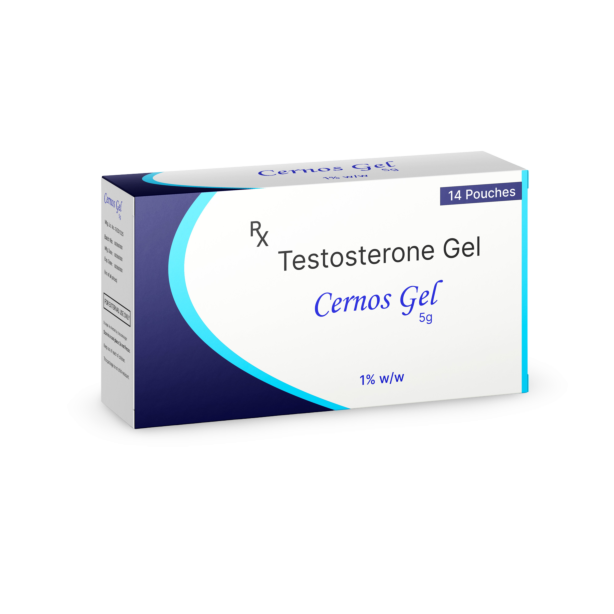
Cernos Gel 1% w/w
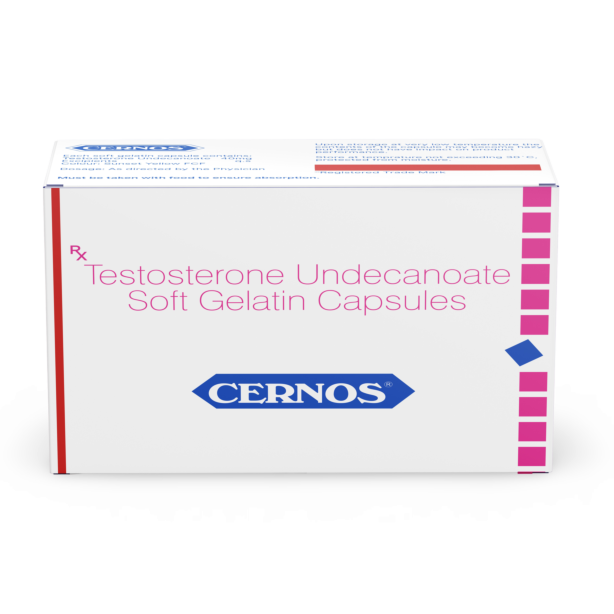
Cernos 40 mg Soft Gelatin Capsule
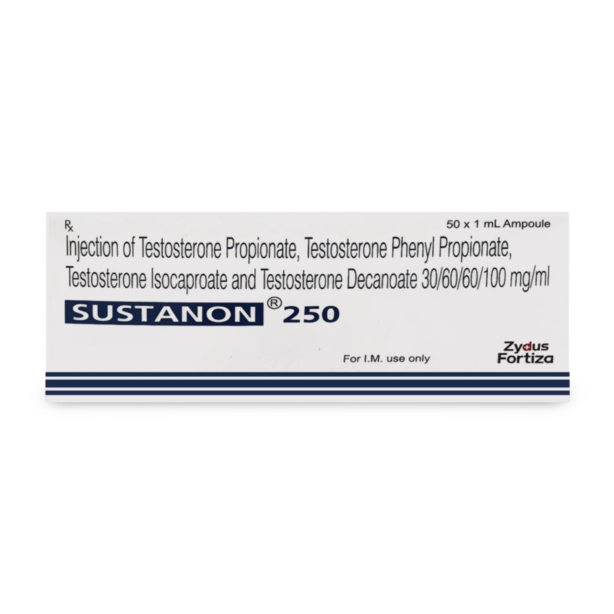
Sustanon 250 Injection
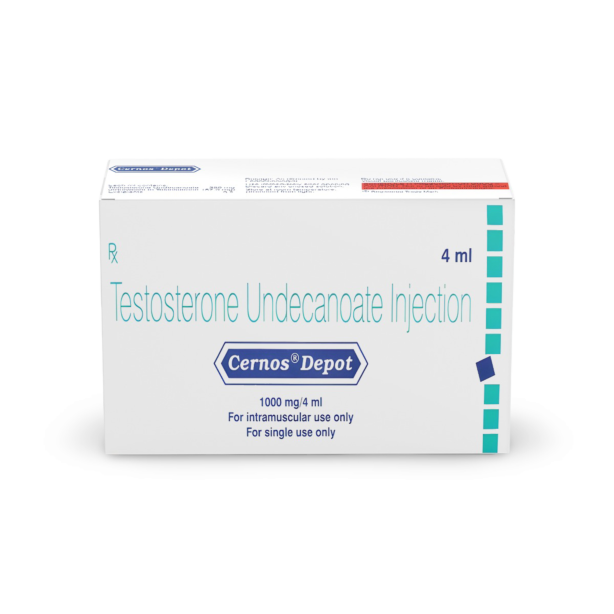
Cernos Depot 1000 mg Injection
Why does Testosterone cause acne?
Testosterone is not a direct cause of acne. It stimulates the skin’s sebaceous (oil) glands, increasing sebum production. Excess sebum, along with dead skin cells, can clog pores and cause acne. Blocked pores can also lead to the growth of bacteria, which may contribute to the formation of acne lesions with pain.
Women (or people with biologically female anatomy) may also experience Testosterone-induced acne due to medical conditions like Polycystic Ovary Syndrome (PCOS). The condition causes hormonal imbalances, leading to High Testosterone levels in women, which could contribute to symptoms like acne.
Testosterone acne can also occur in people undergoing Testosterone Replacement Therapy (TRT) for gender transition or as a treatment for Low Testosterone medical purposes.
How long does Testosterone acne last?
The duration of acne caused by Testosterone can vary among individuals. Acne can occur as the body adapts to changes in hormone levels. For some individuals, it could be a temporary issue that resolves naturally once their hormone levels stabilize.
However, in ongoing hormonal imbalances, acne may continue for a prolonged duration.
Often, people undergoing Testosterone therapy may experience acne breakouts for the first 6 months and then gradually decrease within 12 months.
Others may struggle with it for as long as they take Testosterone, but proper skin care and treatment may help them effectively manage Testosterone acne.
How to get rid of acne from Testosterone?
Treating acne caused by Testosterone involves a regular skincare regimen and, in some cases, medical intervention. For severe or persistent acne, a dermatologist can provide personalized treatment options, which may include prescription medications.
The following are some ways to help address acne associated with High Testosterone levels:
- Balanced diet: Consume a nutrient-dense diet rich in fruits, vegetables, and whole grains. Limit dairy and foods high in glycemic index (GI), which may worsen acne. You can also include foods that lower Testosterone levels, like flaxseed, nuts, and mint, in your diet.
- Consistent skincare routine: Regular cleansing and exfoliation to remove excess oil, dirt, and dead skin cells can help manage acne.
- Avoid heavy cosmetics: Limit heavy makeup or skincare products that can clog pores.
- Topical treatments: Using topical products with ingredients like Salicylic acid or Benzoyl Peroxide may help.
- Medical interventions: In extreme cases, a dermatologist may prescribe antibiotics, topical retinoids like Retino A Cream, or hormonal treatments.
- Stress management: Engage in stress-reduction techniques, as stress can cause a hormonal imbalance and increase acne breakouts.
Conclusion
Does Testosterone cause acne? In some cases, yes, mainly when higher levels of this hormone fuel excess oil production, clog pores, and set the stage for inflamed breakouts. However, Testosterone alone isn’t the sole culprit. Dietary choices, skincare routines, stress, climate, and even genetics play equal roles in determining skin health.
Testosterone-related acne is most common during puberty, in individuals with hormone imbalances, or during hormone therapy, but occurrences vary greatly. The good news? This type of acne can often be managed successfully with consistent skincare, a mindful diet, stress reduction, and dermatologist-prescribed treatments when necessary.
Tackling the cause doesn’t usually mean lowering Testosterone unless a doctor advises. Usually, balancing the skin’s needs is key. By staying informed, you can maintain healthy skin while addressing the factors that make hormonal breakouts more likely.

Frequently Asked Questions
Can certain supplements make Testosterone acne worse?
Yes, supplements like anabolic steroids, Dehydroepiandrosterone (DHEA), or even high quantities of whey protein may increase androgen activity, potentially leading to more sebum and clogged pores in acne-prone individuals.
Is Testosterone acne more severe in people with naturally oily skin?
Usually, yes. Naturally oily skin already has active sebaceous glands, and higher Testosterone can make them overproduce, increasing the risk of clogged pores and inflamed pimples. If you have oily skin, Salicylic Acid products may help. For the best advice, see a doctor.
Do seasonal changes affect Testosterone-related breakouts?
Yes, hot, humid conditions can amplify oiliness and sweat, while cold weather may dry skin, upsetting its balance and still triggering blemishes in sensitive individuals. See a dermatologist for specific management advice if you suspect worsening acne with seasonal changes.
Can stress-related hormones aggravate Testosterone-triggered acne?
Yes, elevated Cortisol from stress can disrupt hormone regulation, indirectly boosting Testosterone’s effects on oil production and inflammation, leading to more frequent or stubborn acne flare-ups. If you suspect stress-related acne, seek medical assistance.
When referencing outside resources, GoodrxMedicine always provides full citations. To learn more about the measures we use to maintain the quality of our content, please review our Content Information Policy.



